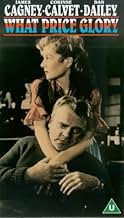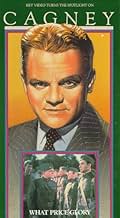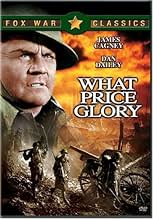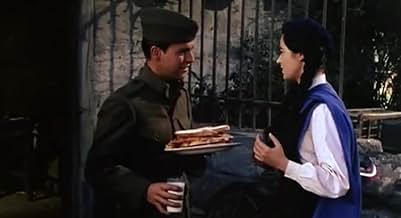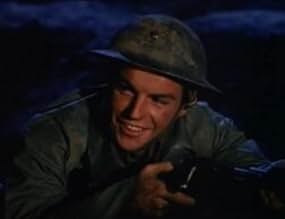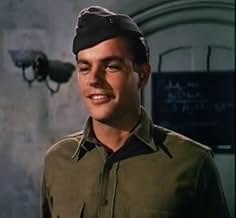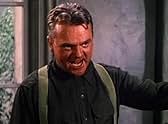VALUTAZIONE IMDb
6,1/10
1501
LA TUA VALUTAZIONE
Aggiungi una trama nella tua linguaThe wartime romantic misadventures of Captain Flagg, commander of a company of US Marines in 1918 France.The wartime romantic misadventures of Captain Flagg, commander of a company of US Marines in 1918 France.The wartime romantic misadventures of Captain Flagg, commander of a company of US Marines in 1918 France.
- Regia
- Sceneggiatura
- Star
Max Showalter
- Lt. Moore
- (as Casey Adams)
Luis Alberni
- Grand Uncle
- (non citato nei titoli originali)
Olga Andre
- Sister Clothilde
- (non citato nei titoli originali)
Tina Blagoi
- Mrs. Bouchard
- (non citato nei titoli originali)
Danny Borzage
- Gilbert
- (non citato nei titoli originali)
George Bruggeman
- German Lieutenant
- (non citato nei titoli originali)
Frederic Brunn
- German Officer
- (non citato nei titoli originali)
Paul Bryar
- Charmaine's Uncle
- (non citato nei titoli originali)
Recensioni in evidenza
This patriotic war film is the bees knees for slap stick, witty comedy. The mixture of wussy brown nosing privates and annoyed sarcastic generals provides a hilarious bitter sweet feeling that can put a smile on your face. Not to mention the constant friendly rivalry between the comedic loud mouthed Captain Flagg (Cagney being Cagney), and the irritated Sergeant Quirt played by Dailey, for the cute and innocent French waitress Charmaine. This movie not only made a great world war 1 film, but proved Cagney was still his energetic, pound for pound, hard nosed self even at 53 years old. The only downside to the movie was the poorly portrayed dramatic war speeches and the failed attempts at giving a life lesson. But all around 8/10
What do you get when you combine an over the hlll Cagney with a second-rate cast and first-rate director? A mess. And that's what this is; a mess. It is so cartoonish in spots that I expected Bugs Bunny to pop out on screen at times. Everyone is over the top, and the only good sequences are between the young man and the young French girl, but those are buried under a tidal wave of cornball, false bravado, tired sterotypes and corny dialogue (did I mention the film was corny?).
And despite all of this corn (which is substantial), parts of the film ring true. Especially the part where Marines go back for second and third servings of frontline crap. I happen to know for a fact this is true; as amazingly stupid as it might appear. My best friend during the Vietnam war was on leave with me in Okinawa for a month. I was in the Army, and he was a marine. He had been wounded twice. And he went back for a third time. After we were drinking for a bit, I asked him how could he be so stupid as to go back for a third time? He told me his friends were there, and that they depended on him. I had nothing I could say. So, some of this corn is true, but most of the film is baloney.
And despite all of this corn (which is substantial), parts of the film ring true. Especially the part where Marines go back for second and third servings of frontline crap. I happen to know for a fact this is true; as amazingly stupid as it might appear. My best friend during the Vietnam war was on leave with me in Okinawa for a month. I was in the Army, and he was a marine. He had been wounded twice. And he went back for a third time. After we were drinking for a bit, I asked him how could he be so stupid as to go back for a third time? He told me his friends were there, and that they depended on him. I had nothing I could say. So, some of this corn is true, but most of the film is baloney.
In the mid-1920s, when What Price Glory? debuted as a play and was filmed for the first time, there was a popular anti-war mood, and cultural works attacking the First World War proliferated. In the early-1950s, with World War Two a recent memory and the Korean war still going on, war movies of every kind were at the height of their popularity, but there was no way they could be openly anti-militaristic. Hence, when Fox Studios decided to resurrect the classic story in 1952 it was largely a comical and de-politicised affair.
With a screenplay by Henry and Phoebe Ephron, this version of What Price Glory? uses virtually none of Maxwell Anderson's original dialogue. The job of direction was handed to John Ford, who was known for staging extended improvisations, creating little vignettes of military life with comical drunkenness and good-natured fistfights. In What Price Glory? this is done to the extent that it actually overshadows any semblance of plot. And not just the anti-war business; the romantic subplots seem weak and disjointed as well.
That's not to say there aren't some good things about this picture. The Technicolor cinematography by Joe MacDonald is often breathtaking, giving a haunting quality to the mist-shrouded battlegrounds. Ford was as always a good visual director, often using stark contrasts in depth to bring different ideas to our attention in the one shot. For example, as the troops march off to the front, a mass of drab browns and greys, we see Corinne Calvet in a bold red, white and blue dress – a human flag and a reminder of what the men are leaving behind them. And James Cagney is good fun in one of his purely comic roles.
But there is little else to recommend about this What Price Glory? Various scenes look to have been filmed with an emphasis on pathos, but they don't work within the structure of the whole thing. When a young Robert Wagner makes the central speech in which the words of the title are spoken, it seems barely to relate to the rest of the picture. And it's not the mixing of comedy with the realities of war per se that makes it fall apart – after all this is the basis of such classics as The Big Parade and MASH – it's just that the balance is wrong. It simply fails to take the war seriously enough, and the "serious" moments seem like flimsy little inserts. Of course, if it had been a tight and hard-hitting anti-war drama, it would most likely have fallen foul of the censors and/or stifled the careers of its creative team. As it was, this vague mish-mash of bar songs and army jokes was conveniently inoffensive.
With a screenplay by Henry and Phoebe Ephron, this version of What Price Glory? uses virtually none of Maxwell Anderson's original dialogue. The job of direction was handed to John Ford, who was known for staging extended improvisations, creating little vignettes of military life with comical drunkenness and good-natured fistfights. In What Price Glory? this is done to the extent that it actually overshadows any semblance of plot. And not just the anti-war business; the romantic subplots seem weak and disjointed as well.
That's not to say there aren't some good things about this picture. The Technicolor cinematography by Joe MacDonald is often breathtaking, giving a haunting quality to the mist-shrouded battlegrounds. Ford was as always a good visual director, often using stark contrasts in depth to bring different ideas to our attention in the one shot. For example, as the troops march off to the front, a mass of drab browns and greys, we see Corinne Calvet in a bold red, white and blue dress – a human flag and a reminder of what the men are leaving behind them. And James Cagney is good fun in one of his purely comic roles.
But there is little else to recommend about this What Price Glory? Various scenes look to have been filmed with an emphasis on pathos, but they don't work within the structure of the whole thing. When a young Robert Wagner makes the central speech in which the words of the title are spoken, it seems barely to relate to the rest of the picture. And it's not the mixing of comedy with the realities of war per se that makes it fall apart – after all this is the basis of such classics as The Big Parade and MASH – it's just that the balance is wrong. It simply fails to take the war seriously enough, and the "serious" moments seem like flimsy little inserts. Of course, if it had been a tight and hard-hitting anti-war drama, it would most likely have fallen foul of the censors and/or stifled the careers of its creative team. As it was, this vague mish-mash of bar songs and army jokes was conveniently inoffensive.
Marine buddies James Cagney (as Captain Flagg) and Dan Dailey (as Sergeant Quirt) carouse through World War I, and eventually become rivals for the affections of beautifully-proportioned Frenchwoman Corinne Calvet (as Charmaine). Newly arriving from Philadelphia, handsome 22-year-old Robert Wagner (as Private Lewisohn) is attracted to local 17-year-old Marisa Pavan (as Nicole Bouchard). The pretty, dark-haired girl's father is upset. Rivaling Mr. Wagner for handsomeness, Craig Hill (as Aldrich) asks the titular question, "What price glory?" Future TV stars William Demarest and Harry Morgan support the troops...
This successful stage comedy-drama became a huge "silent" film hit for Fox in 1926, winning Quigley Publications "Best Picture" award and rising high in everyone's "Ten Best" list for the year. This 1952 re-make did not score as well with audiences...
One of the original film's "all-talking" comedy sequels was the semi-musical "The Cock-Eyed World" (1929), which is how this project was initially envisioned. We have colorful cinematic sets, a few remaining musical performances and stage-lighting techniques. Director John Ford and the Fox personnel assembled were much more aware of the earlier films, helping to explain this misfire. The story began as an anti-war statement; while present, the point gets lost in the inebriated interplay between Mr. Cagney and Mr. Dailey. The actors are forced to alternate between broad "F Troop"-style antics and the accumulation of dead bodies.
***** What Price Glory (7/25/52) John Ford ~ James Cagney, Dan Dailey, Corinne Calvet, Robert Wagner
This successful stage comedy-drama became a huge "silent" film hit for Fox in 1926, winning Quigley Publications "Best Picture" award and rising high in everyone's "Ten Best" list for the year. This 1952 re-make did not score as well with audiences...
One of the original film's "all-talking" comedy sequels was the semi-musical "The Cock-Eyed World" (1929), which is how this project was initially envisioned. We have colorful cinematic sets, a few remaining musical performances and stage-lighting techniques. Director John Ford and the Fox personnel assembled were much more aware of the earlier films, helping to explain this misfire. The story began as an anti-war statement; while present, the point gets lost in the inebriated interplay between Mr. Cagney and Mr. Dailey. The actors are forced to alternate between broad "F Troop"-style antics and the accumulation of dead bodies.
***** What Price Glory (7/25/52) John Ford ~ James Cagney, Dan Dailey, Corinne Calvet, Robert Wagner
Well, despite having made "The Sands of Iwo Jima", John Ford made a movie about World War I Marines that doesn't really seem to be about Marines at all. I'm not a student of World War I Marine slang, but it seemed odd for Captain Flagg to pronounce Sergeant Quirt his "Top Soldier" and for Marines to refer to each other as soldiers. Despite the fact that they under French command, I found it odd for them to refer to being in the Army, since they are in the Corps. Go figure.
The two combat scenes are amateurish, even by Ford's standards. The acting is not convincing (except when Robert Wagner dies and Cagney manages not to over-act it) and while you can believe the two main characters don't like each other at the beginning, you never believe there's some odd tie binding them together. The character development is relatively tame, with only Wagner and Harry Morgan (Colonel Potter as a Marine Corporal and quartermaster!) showing any depth among the minor Marine characters.
Dan Dailey does play a convincing loud, parade ground senior NCO. He conveys the conniving and womanizing well, but when he is supposed to have finally fallen for the French beauty, it's hard to believe. Cagney plays merely a caricature of the hard-bitten, seen-it-all Marine. His final scene neither convinces you he considers staying or that the Corps means so much to him that he has to go.
The worst part is when a wounded Marine shouts out the title of the movie. It's something along the lines of "Are you going to get in the game, Captain? There's two minutes left and we need a hero. What price glory, Captain? What price glory?" One can imagine that delivered stirringly by a character whose motivation we understand, but instead, it is shouted by a nameless face with only a crazed look. It also would help if the Captain had been portrayed as a glory hound instead of drunken, war-weary yet sympathetic. I guess they had to get the name of the movie in somehow....
I was trying to imagine John Ford's World War I and was sadly disappointed that it wasn't more moving.
The two combat scenes are amateurish, even by Ford's standards. The acting is not convincing (except when Robert Wagner dies and Cagney manages not to over-act it) and while you can believe the two main characters don't like each other at the beginning, you never believe there's some odd tie binding them together. The character development is relatively tame, with only Wagner and Harry Morgan (Colonel Potter as a Marine Corporal and quartermaster!) showing any depth among the minor Marine characters.
Dan Dailey does play a convincing loud, parade ground senior NCO. He conveys the conniving and womanizing well, but when he is supposed to have finally fallen for the French beauty, it's hard to believe. Cagney plays merely a caricature of the hard-bitten, seen-it-all Marine. His final scene neither convinces you he considers staying or that the Corps means so much to him that he has to go.
The worst part is when a wounded Marine shouts out the title of the movie. It's something along the lines of "Are you going to get in the game, Captain? There's two minutes left and we need a hero. What price glory, Captain? What price glory?" One can imagine that delivered stirringly by a character whose motivation we understand, but instead, it is shouted by a nameless face with only a crazed look. It also would help if the Captain had been portrayed as a glory hound instead of drunken, war-weary yet sympathetic. I guess they had to get the name of the movie in somehow....
I was trying to imagine John Ford's World War I and was sadly disappointed that it wasn't more moving.
Lo sapevi?
- QuizJohn Ford was an uncredited second unit director in the 1926 version directed by Raoul Walsh.
- BlooperCaptain Flagg's command was referred to as L Company, 5th Marines. In WWI Marine Companies were numbered. Prior to WWI they served independently with battalions and above were ad hoc organizations. 5th Marines should 5th Regiment. The change from Regiment to Marines wouldn't come until the 30s.
- Citazioni
Captain Flagg: It's a lousy war, kid... but it's the only one we've got.
- ConnessioniFeatured in L'unico gioco in città (1970)
- Colonne sonoreOui, Oui, Marie
(uncredited)
Music by Fred Fisher
Lyrics by Al Bryan and Joseph McCarthy
Sung by Corinne Calvet and chorus
I più visti
Accedi per valutare e creare un elenco di titoli salvati per ottenere consigli personalizzati
- How long is What Price Glory?Powered by Alexa
Dettagli
- Data di uscita
- Paese di origine
- Lingue
- Celebre anche come
- El precio de la gloria
- Luoghi delle riprese
- Marine Corps Base Camp Pendleton, California, Stati Uniti(army base scenes)
- Azienda produttrice
- Vedi altri crediti dell’azienda su IMDbPro
- Tempo di esecuzione1 ora 51 minuti
- Proporzioni
- 1.37 : 1
Contribuisci a questa pagina
Suggerisci una modifica o aggiungi i contenuti mancanti


